人教版(2019)选择性必修第一册Unit 4 Body Language Review 课件(30张PPT)
文档属性
| 名称 | 人教版(2019)选择性必修第一册Unit 4 Body Language Review 课件(30张PPT) | 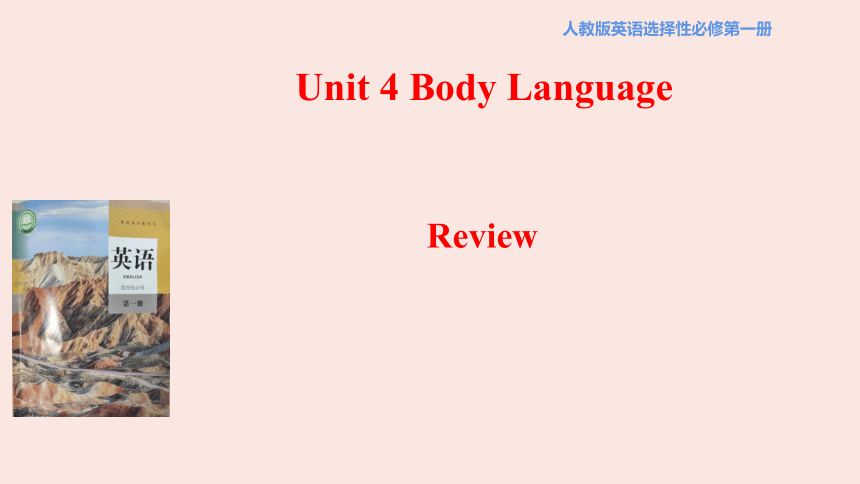 | |
| 格式 | pptx | ||
| 文件大小 | 1.7MB | ||
| 资源类型 | 教案 | ||
| 版本资源 | 人教版(2019) | ||
| 科目 | 英语 | ||
| 更新时间 | 2022-11-11 07:48:42 | ||
图片预览

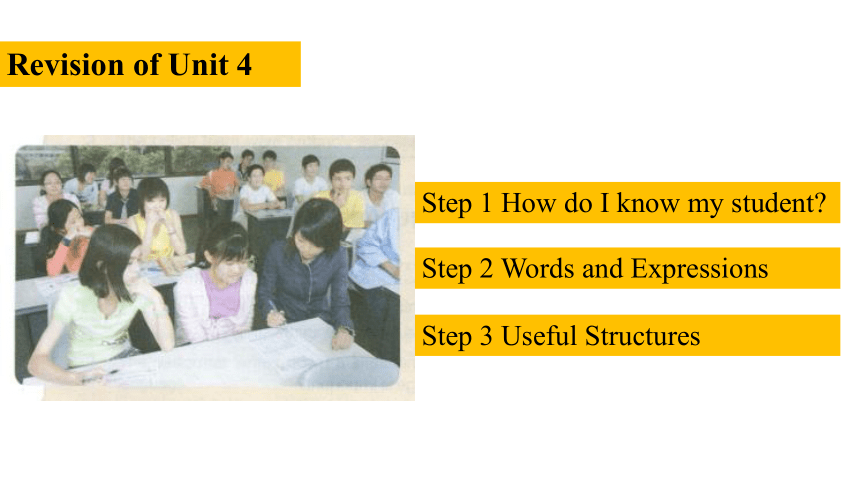
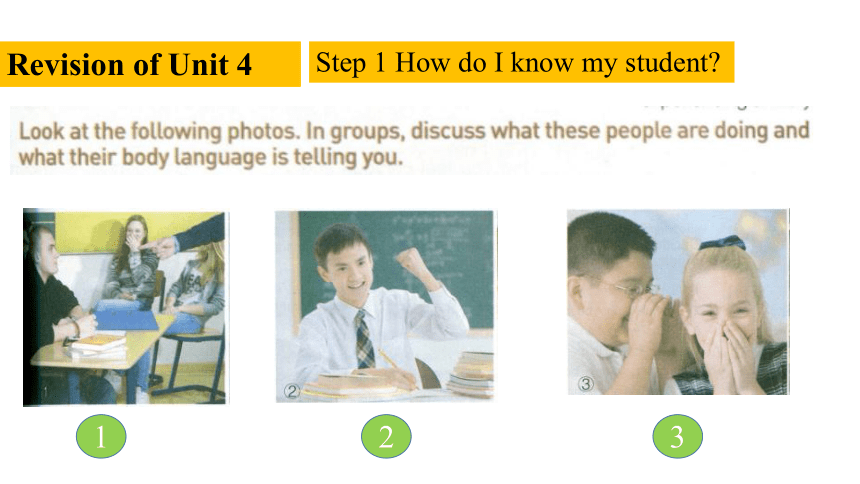
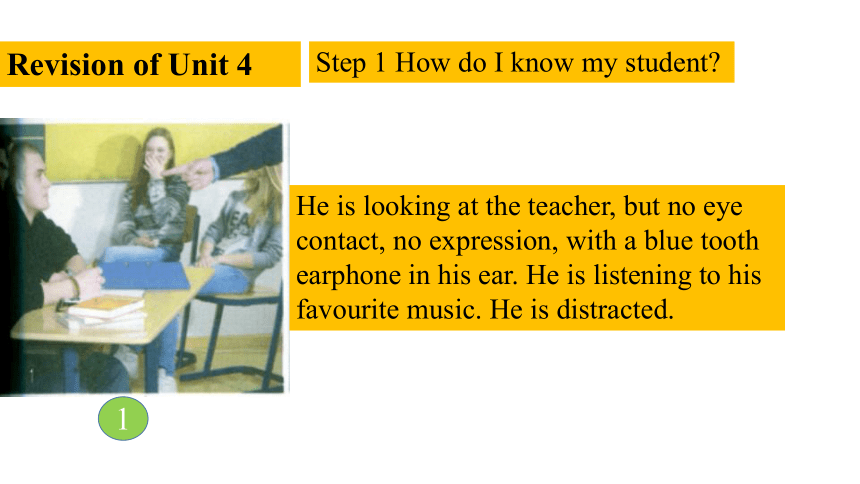
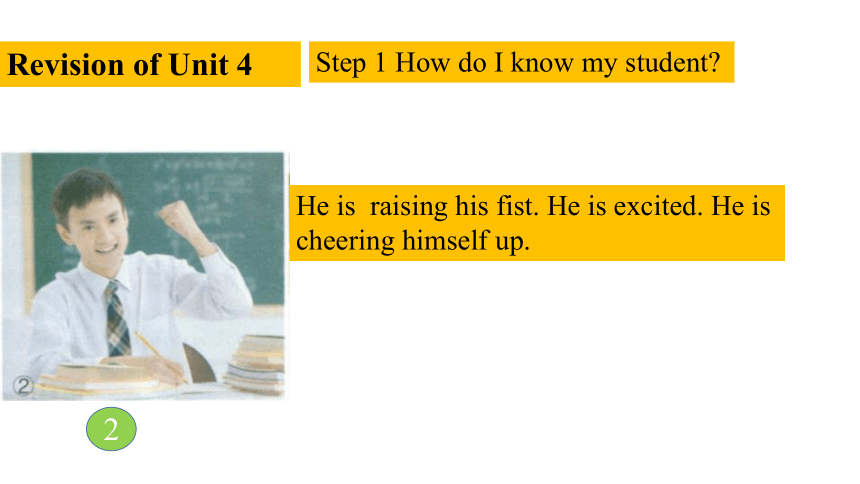
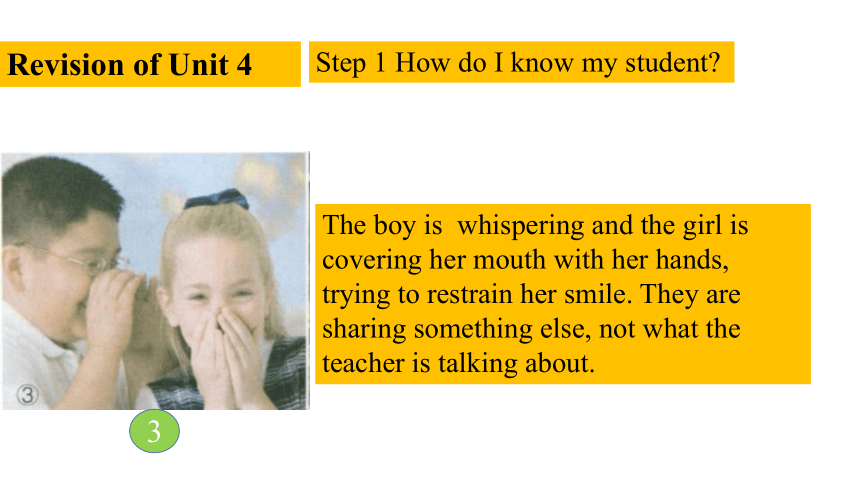
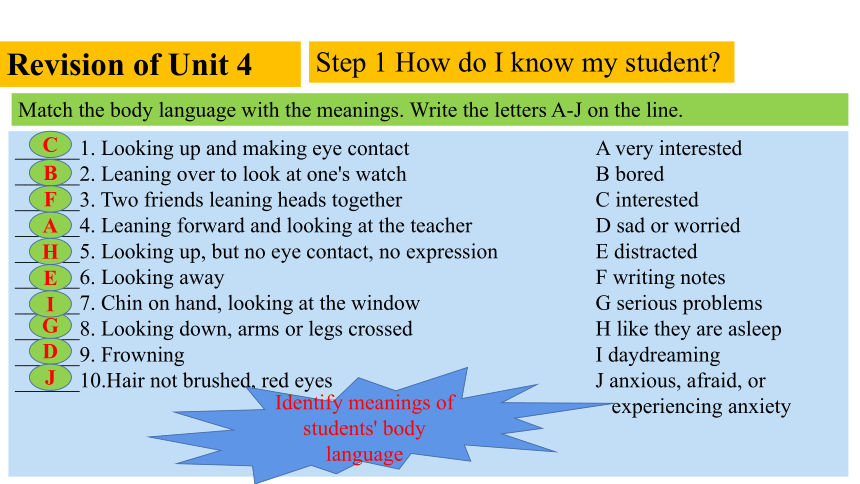
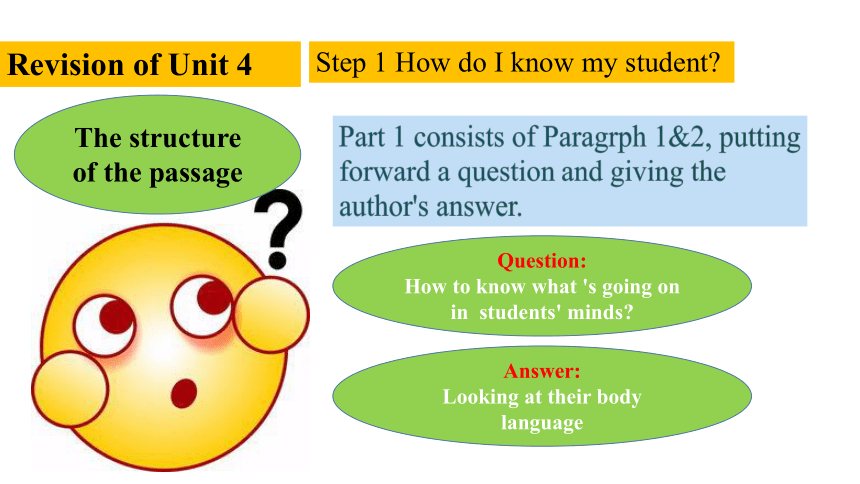
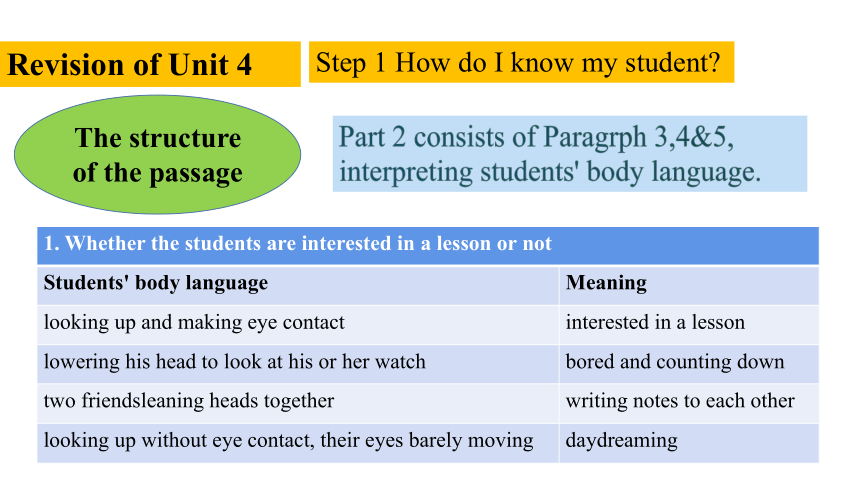
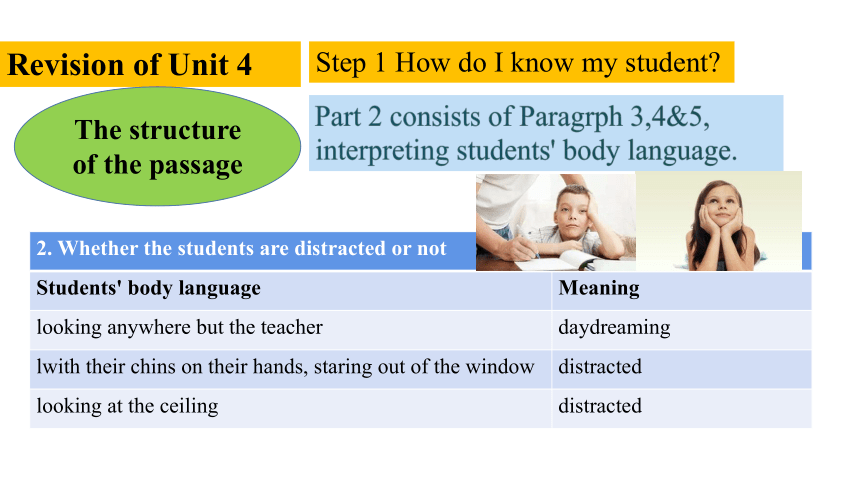
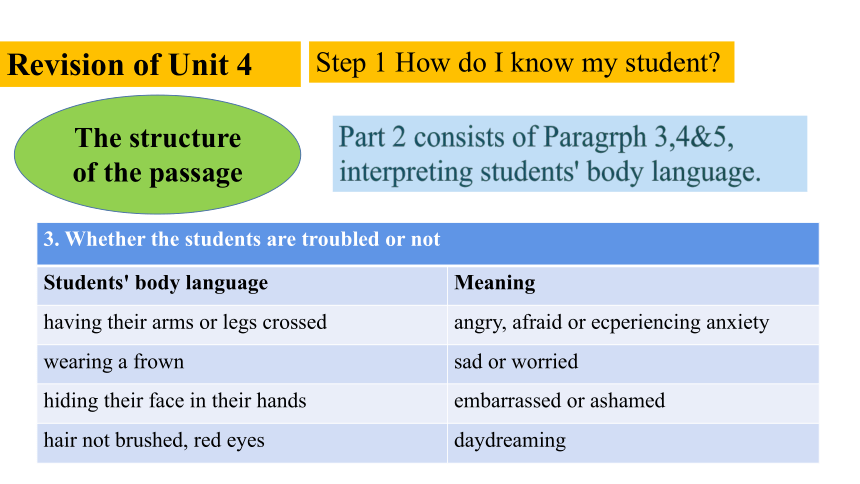
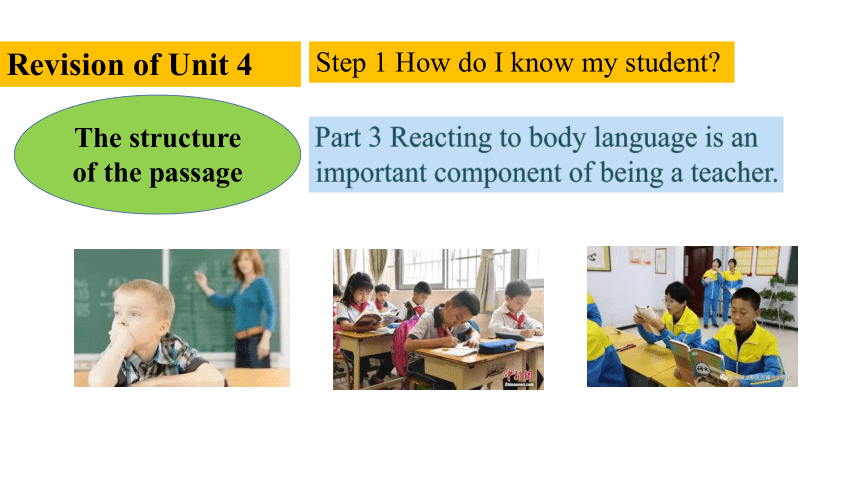
文档简介
(共30张PPT)
人教版英语选择性必修第一册
Unit 4 Body Language
Review
Step 1 How do I know my student
Step 2 Words and Expressions
Step 3 Useful Structures
Revision of Unit 4
Revision of Unit 4
Step 1 How do I know my student
1
2
3
Revision of Unit 4
Step 1 How do I know my student
1
He is looking at the teacher, but no eye contact, no expression, with a blue tooth earphone in his ear. He is listening to his favourite music. He is distracted.
Revision of Unit 4
Step 1 How do I know my student
2
He is raising his fist. He is excited. He is cheering himself up.
Revision of Unit 4
Step 1 How do I know my student
The boy is whispering and the girl is covering her mouth with her hands, trying to restrain her smile. They are sharing something else, not what the teacher is talking about.
3
Revision of Unit 4
Step 1 How do I know my student
Match the body language with the meanings. Write the letters A-J on the line.
______1. Looking up and making eye contact A very interested
______2. Leaning over to look at one's watch B bored
______3. Two friends leaning heads together C interested
______4. Leaning forward and looking at the teacher D sad or worried
______5. Looking up, but no eye contact, no expression E distracted
______6. Looking away F writing notes
______7. Chin on hand, looking at the window G serious problems
______8. Looking down, arms or legs crossed H like they are asleep
______9. Frowning I daydreaming
______10.Hair not brushed, red eyes J anxious, afraid, or
experiencing anxiety
A
B
C
D
E
F
G
H
I
J
Identify meanings of students' body language
Revision of Unit 4
Step 1 How do I know my student
The structure of the passage
Part 1 consists of Paragrph 1&2, putting forward a question and giving the author's answer.
Question:
How to know what 's going on in students' minds
Answer:
Looking at their body language
Revision of Unit 4
Step 1 How do I know my student
The structure of the passage
Part 2 consists of Paragrph 3,4&5, interpreting students' body language.
1. Whether the students are interested in a lesson or not Students' body language Meaning
looking up and making eye contact interested in a lesson
lowering his head to look at his or her watch bored and counting down
two friendsleaning heads together writing notes to each other
looking up without eye contact, their eyes barely moving daydreaming
Revision of Unit 4
Step 1 How do I know my student
The structure of the passage
Part 2 consists of Paragrph 3,4&5, interpreting students' body language.
2. Whether the students are distracted or not Students' body language Meaning
looking anywhere but the teacher daydreaming
lwith their chins on their hands, staring out of the window distracted
looking at the ceiling distracted
Revision of Unit 4
Step 1 How do I know my student
The structure of the passage
Part 2 consists of Paragrph 3,4&5, interpreting students' body language.
3. Whether the students are troubled or not Students' body language Meaning
having their arms or legs crossed angry, afraid or ecperiencing anxiety
wearing a frown sad or worried
hiding their face in their hands embarrassed or ashamed
hair not brushed, red eyes daydreaming
Revision of Unit 4
Step 1 How do I know my student
The structure of the passage
Part 3 Reacting to body language is an important component of being a teacher.
Revision of Unit 4
Step 2 Key Words and Expressions
1. educate vt. & vi.教育;培养;训练
He ____________(educate) at Yale and Stanford. 他是在耶鲁和斯坦福接受的教育。
★educator n. 教育家;教育工作者;教师
The best way to teach —whether as an __________(educate) or parent —is to praise
positive actions and ignore negative ones.
最佳教育方式,不管是作为一个教育工作者还是父母,都是表扬积极的行为,忽
略负面的行为。
★education n. 教育
A good __________(educate) is the gateway to success. 良好的教育是通往成功之路。
★educational adj. 教育的;有教育意义的:有教益的
Watching television can be very ____________(educate). 看电视会使人受到很多教益。
★educated adj. 受过教育的;有教养的
The new CEO is an __________(educate)and decent man.
新的首席执行官是一位受过良好教育的,正派的人。
was educated
educator
education
educational
educated
Revision of Unit 4
Step 2 Words and Expressions
2. tendency n. 倾向,趋势;癖好;复数 tendencies
★a tendency to/towards...的倾向
There is a tendency towards regional cooperation. 有一种地区性合作的趋势。
★There is a tendency to do...有发生某事的倾向
Today there is a tendency for people __________(drop) out of social activity.
现在,越来越多的人倾向于不参加社会活动。
★tend vi. & vt. 趋向,倾向;照料,照顾
★tend to do...倾向于; 往往会
Weeds tend ____________(displace) other plants.
杂草越来越多,有取代其他植物之势。
Mother being ill, he had to _________(照顾) her at home.
母亲病了,他得在家照料她。
to drop
to displace
tend
Revision of Unit 4
Step 2 Words and Expressions
3. lower v. 变恶劣,放下,降低,贬低 move downword
Two reporters had to help lower the coffin into the grave.(降下)
两名记者不得不帮忙把棺材下放至墓穴中。
He lowered himself into the black leather chair. 他缓缓地在黑皮椅里坐下。(降下)
She lowered her head as she went back inside. 当她走回屋里时,她垂下了头。(垂下)
lower one's voice 放低 (声音)
4. imply vt. 意味;暗示;意味着
过去式 implied 过去分词 implied 现在分词 implying 第三人称单数 implies
★implication n. 含义;暗示;
The _____________(imply) was obvious: vote for us or it will be very embarrassing for
you. 含意很明显:投票给我们,否则你会很难堪。
implication
Revision of Unit 4
Step 2 Words and Expressions
5. barely adv. 仅仅,勉强;几乎不;贫乏地;好不容易才
He barelynoticeded our presence. 他几乎没有注意到我们在场。
...had barely+动词过去分词 when+一般过去时态:刚...就...(描述过去发生的两件事,刚
刚发生完前面的事〖过去完成时〗,就发生了后面的事〖一般过去时〗)
翻译练习:
我刚走上那条街就发现自己迷路了。
他刚刚休息就又被人叫出去了。
他刚刚读完,字就再次消失了。
I had barely set foot in the street when I realized I was lost.
He had barely rested when he was called out again.
He had barely read them when the words vanished again.
Revision of Unit 4
Step 2 Words and Expressions
6. occupy vt. 占据,占领;居住;使忙碌
过去式 occupied 过去分词 occupied 现在分词 occupying 第三人称单数 occupies
U.S. forces now occupy a part of the country. 美国军队现在占领着该国的一部分地区。
★occupy oneself with sth/doing sth... = be busy with/doing
使 (自己、自己的时间、自己的思维) 被 (某事物) 占据
翻译练习
他忙着装那辆车。
★occupation n. 职业;占有;消遣;占有期;复数 occupations
翻译练习
你为什么对这个职业感兴趣?
★occupational adj. 职业的;占领的
______________(occupation) schools have been set up to train people in jobs that they may
be better suited for.
职业学校已经被建立起来,以便培训人们从事他们可能更适合的工作。
He occupied himself with packing the car.
Why are you interested in this occupation
Occupational
Revision of Unit 4
Step 2 Words and Expressions
7. perceive vt. 察觉到,感觉到;理解;认知
We can perceive his sorrow by the looks on his face. 我们从他的表情中觉察出悲伤。
★perceivable adj. 可知觉的,可感知的
★perceivably adv. 可知觉地,可感知地
★perception n. 认识能力;知觉,感觉;洞察力;看法;复数 perceptions
One of his goals is improving students' _____________(perceive) in this matter.
他的目标之一是提高学生对该问题的认识能力。
perception
Revision of Unit 4
Step 2 Words and Expressions
8. distinguish vt. 区分;辨别;使杰出,使表现突出
翻译练习
很难分辨出一对孪生儿谁是谁。
★distinguished adj. 卓越的,著名的;高贵的,受尊重的
翻译练习
他是这一领域成就最为卓著的学者。
★distinguishable adj. 可区分的;隐约可辨的
It was getting light and shapes were more ______________(distinguish).
天亮了起来,物形可以看得更清楚了。
It was hard to distinguish one twin from the other.
He is the most distinguished scholar in his field.
distinguishable
Revision of Unit 4
Step 2 Words and Expressions
9. anxiety n. 焦虑;渴望;挂念;令人焦虑的事;复数 anxieties
Some hospital patients experience high levels of anxiety.
有些住院病人正在经历高度的焦虑。
★anxious adj. 焦虑的;担忧的;渴望的;急切的;
★比较级 more anxious 最高级 most anxious
be anxious about ...对...感到焦虑不安
★anxiously adj. 焦虑地;担忧地;渴望地;急切地;
She kept looking at her watch ___________(anxious).
她焦急不安地一个劲儿看表。
anxiously
Revision of Unit 4
Step 2 Words and Expressions
10. embarrass v. (尤指在社交场合)使窘迫,使尴尬;使困惑;使为难;
过去式 embarrassed 过去分词 embarrassed
现在分词 embarrassing 第三人称单数 embarrasses
翻译练习
在西方文化,目光接触很常见,但太多的目光接触在某些亚洲文化中则令人窘迫。
★embarrassing adj.令人尴尬的
embarrassed adj. 感到尴尬的
That was an _______________(embarrass) situation for me.
对我来说,那是个令人尴尬的场面。
★embarrassment n. 窘迫,难堪;使人为难的人或事物;复数 embarrassments
Eye contact is very common in Western cultures but too much eye contact may embarrass people in some Asian cultures.
embarrassing
Revision of Unit 4
Step 2 Words and Expressions
11. ashamed adj. 羞愧的,羞耻的;惭愧的,内疚的;尴尬的;觉得丢脸的
比较级 more ashamed 最高级 most ashamed
★be ashamed of...对…感到羞耻;对…感到惭愧
翻译练习
她对自己在聚会上的行为深感羞愧。
★shameful adj. 可耻的;不体面的;不道德的;
比较级 more shameful 最高级 most shameful
Only those who have no sense of shame can do such ___________(shame) things.
只有没有羞耻感的人才能做出这样不要脸的事。
She was deeply ashamed of her behaviour at the party.
shameful
Revision of Unit 4
Step 2 Words and Expressions
12. bother vt. & vi. 烦扰,打扰;使……不安;使……恼怒;操心,麻烦;烦恼
★not bother to do ...不费心去做某事
★not bother with...对...不费心
★bother sb 麻烦某人,打扰某人
翻译练习
我非常抱歉这个时候来打搅您。
I'm terribly sorry to bother you at this hour.
Revision of Unit 4
Step 2 Words and Expressions
13. react vi. 反应,作出反应;产生(化学)反应;
★react to ...对...做出反应(to为介词)
翻译练习
他们对这个新闻反应强烈。
★reaction n. 反应,感应;反动,反作用,复数 reactions ]、
reaction to...对...的反应
reaction against....抵触/反抗... a reaction against the reform 对改革的抵触
They reacted violently to the news.
Revision of Unit 4
Step 2 Words and Expressions
14. adjust vt. & vi. 调整,使…适合;校准;调整,校准;适应
过去式 adjusted 过去分词 adjusted 现在分词 adjusting 第三人称单数 adjusts
★ adjust (oneself) to... 调整以适应...
翻译练习
动物能自己适应环境。
★ adjustment n. 调整,调节;调节器;复数 adjustments
a period of emotional adjustment 感情调整期
price adjustment 价格调整
seasonal adjustment 季节性调整
speed adjustment 速度调整
Animals can adjust themselves to the environment.
Revision of Unit 4
Step 2 Words and Expressions
15. ultimately adv. 最后;最终;基本上
A poor diet will ultimately lead to illness.
糟糕的饮食终将导致疾病。
★ultimate adj. 最终的;极限的;根本的
ultimate goal 终极目标
翻译练习
他说现在还不可能预测最终的结果。
He said it was not possible to predict the ultimate outcome.
Revision of Unit 4
Step 3 Useful Structures
动词的-ing形式练习
1. As a result of the serious flood, two thirds of the buildings in the area______.
A. need repairing B. needs to repair C. needs repairing D. need to repair
2. The officers narrowly escaped from _________in the hot battle.
A. have killed B. to kill C. to be killed D. being killed
3. _______the letter, he went out to post it.
A. Writing B. Being writing C. Having written D. Written
4. _______ anything about the accident, he went to work as usual.
A. Not known B. Known not C. Knowing not D. Not knowing
5. There was terrible noise _______ the sudden burst of light.
A. followed B. following C. to be followed D. being followed
非谓语动词的确定要素:与逻辑主语的关系(主动还是被动)
与谓语动词的先后顺序(先发生,同时,还是未发生)
固定的句型或结构(尤其是不受逻辑主语分析限制的短语)
A
D
C
D
B
Revision of Unit 4
Step 3 Useful Structures
1. The secretary worked late into the night, ________ a long speech for the president.
A. to prepare B. preparing C. prepared D. was preparing
2. "Can't you read " Mary said ________ to the notice.
A. angrily pointing B. and point angrily
C. angrily pointed D. and angrily pointing
3. —I must apologize for ________ahead of time. —That's all right.
A. letting you not know B. not letting you know
C. letting you know not D. letting not you know
4. —You were brave enough to raise objections at the meeting.
—Well, now I regret ________ that.
A. to do B. to be doing C. to have done D. having done
5. He suggested ________ on Saturday.
A. to have a meeting B. having a meeting
C. a meeting to have D. that having a meeting
B
A
B
D
B
Revision of Unit 4
Step 3 Useful Structures
1. It is no good ________ to come now. He is busy.
A. if you ask him B. to ask him C. asking him D. that you ask him
2. Although punctual himself, the professor was quite used ________ late for his lecture.
A. to have students B. for students to be
C. for students' being D. to students' being
3. He dressed himself quickly and ________ his schoolbag, went to school.
A. carried B. to carry C. carrying D. carries
4. ________ for several weeks, the city needed food.
A. As having flooded B. Being flooded
C. Having been flooded D. To flood
5. She is writing a letter to a friend of hers, ________ him to attend the meeting.
A. having invited B. inviting C. to invite D. invited
C
D
A
C
B
提示第3题:请大家一定注意句子里的并列连词and,几个谓语动词并列,所以答案为A
Revision of Unit 4
Step 3 Useful Structures
1. Our town has dozens of factories, ___________several saw mills.
A. included B. are including C. are included D. including
2. _______ the classroom, the students went to the playground to watch the football match.
A. To clean B. Having cleaned C. Cleaned D. Cleaning
3.(北京) _______in the queue for half an hour, Tom suddenly realized that he had left his wallet at home.
A. To wait B. Have waited C. Having waited D. To have waited
4.(上海) According to a recent survey, children spent up to 25 hours a week ______TV.
A. to watch B. to watch C. watching D. watch
5.(上海) The flu is believed _______ by viruses that like to reproduce in the cells inside the human nose and throat.
A. causing B. being caused C. to be caused D. to have caused
6.(上海) The flowers ______ sweet in the botanic garden attract the visitors to the beauty of nature.
A. to smell B. smelling C. smelt D. to be smelt
D
B
C
C
C
B
人教版英语选择性必修第一册
Unit 4 Body Language
Review
Step 1 How do I know my student
Step 2 Words and Expressions
Step 3 Useful Structures
Revision of Unit 4
Revision of Unit 4
Step 1 How do I know my student
1
2
3
Revision of Unit 4
Step 1 How do I know my student
1
He is looking at the teacher, but no eye contact, no expression, with a blue tooth earphone in his ear. He is listening to his favourite music. He is distracted.
Revision of Unit 4
Step 1 How do I know my student
2
He is raising his fist. He is excited. He is cheering himself up.
Revision of Unit 4
Step 1 How do I know my student
The boy is whispering and the girl is covering her mouth with her hands, trying to restrain her smile. They are sharing something else, not what the teacher is talking about.
3
Revision of Unit 4
Step 1 How do I know my student
Match the body language with the meanings. Write the letters A-J on the line.
______1. Looking up and making eye contact A very interested
______2. Leaning over to look at one's watch B bored
______3. Two friends leaning heads together C interested
______4. Leaning forward and looking at the teacher D sad or worried
______5. Looking up, but no eye contact, no expression E distracted
______6. Looking away F writing notes
______7. Chin on hand, looking at the window G serious problems
______8. Looking down, arms or legs crossed H like they are asleep
______9. Frowning I daydreaming
______10.Hair not brushed, red eyes J anxious, afraid, or
experiencing anxiety
A
B
C
D
E
F
G
H
I
J
Identify meanings of students' body language
Revision of Unit 4
Step 1 How do I know my student
The structure of the passage
Part 1 consists of Paragrph 1&2, putting forward a question and giving the author's answer.
Question:
How to know what 's going on in students' minds
Answer:
Looking at their body language
Revision of Unit 4
Step 1 How do I know my student
The structure of the passage
Part 2 consists of Paragrph 3,4&5, interpreting students' body language.
1. Whether the students are interested in a lesson or not Students' body language Meaning
looking up and making eye contact interested in a lesson
lowering his head to look at his or her watch bored and counting down
two friendsleaning heads together writing notes to each other
looking up without eye contact, their eyes barely moving daydreaming
Revision of Unit 4
Step 1 How do I know my student
The structure of the passage
Part 2 consists of Paragrph 3,4&5, interpreting students' body language.
2. Whether the students are distracted or not Students' body language Meaning
looking anywhere but the teacher daydreaming
lwith their chins on their hands, staring out of the window distracted
looking at the ceiling distracted
Revision of Unit 4
Step 1 How do I know my student
The structure of the passage
Part 2 consists of Paragrph 3,4&5, interpreting students' body language.
3. Whether the students are troubled or not Students' body language Meaning
having their arms or legs crossed angry, afraid or ecperiencing anxiety
wearing a frown sad or worried
hiding their face in their hands embarrassed or ashamed
hair not brushed, red eyes daydreaming
Revision of Unit 4
Step 1 How do I know my student
The structure of the passage
Part 3 Reacting to body language is an important component of being a teacher.
Revision of Unit 4
Step 2 Key Words and Expressions
1. educate vt. & vi.教育;培养;训练
He ____________(educate) at Yale and Stanford. 他是在耶鲁和斯坦福接受的教育。
★educator n. 教育家;教育工作者;教师
The best way to teach —whether as an __________(educate) or parent —is to praise
positive actions and ignore negative ones.
最佳教育方式,不管是作为一个教育工作者还是父母,都是表扬积极的行为,忽
略负面的行为。
★education n. 教育
A good __________(educate) is the gateway to success. 良好的教育是通往成功之路。
★educational adj. 教育的;有教育意义的:有教益的
Watching television can be very ____________(educate). 看电视会使人受到很多教益。
★educated adj. 受过教育的;有教养的
The new CEO is an __________(educate)and decent man.
新的首席执行官是一位受过良好教育的,正派的人。
was educated
educator
education
educational
educated
Revision of Unit 4
Step 2 Words and Expressions
2. tendency n. 倾向,趋势;癖好;复数 tendencies
★a tendency to/towards...的倾向
There is a tendency towards regional cooperation. 有一种地区性合作的趋势。
★There is a tendency to do...有发生某事的倾向
Today there is a tendency for people __________(drop) out of social activity.
现在,越来越多的人倾向于不参加社会活动。
★tend vi. & vt. 趋向,倾向;照料,照顾
★tend to do...倾向于; 往往会
Weeds tend ____________(displace) other plants.
杂草越来越多,有取代其他植物之势。
Mother being ill, he had to _________(照顾) her at home.
母亲病了,他得在家照料她。
to drop
to displace
tend
Revision of Unit 4
Step 2 Words and Expressions
3. lower v. 变恶劣,放下,降低,贬低 move downword
Two reporters had to help lower the coffin into the grave.(降下)
两名记者不得不帮忙把棺材下放至墓穴中。
He lowered himself into the black leather chair. 他缓缓地在黑皮椅里坐下。(降下)
She lowered her head as she went back inside. 当她走回屋里时,她垂下了头。(垂下)
lower one's voice 放低 (声音)
4. imply vt. 意味;暗示;意味着
过去式 implied 过去分词 implied 现在分词 implying 第三人称单数 implies
★implication n. 含义;暗示;
The _____________(imply) was obvious: vote for us or it will be very embarrassing for
you. 含意很明显:投票给我们,否则你会很难堪。
implication
Revision of Unit 4
Step 2 Words and Expressions
5. barely adv. 仅仅,勉强;几乎不;贫乏地;好不容易才
He barelynoticeded our presence. 他几乎没有注意到我们在场。
...had barely+动词过去分词 when+一般过去时态:刚...就...(描述过去发生的两件事,刚
刚发生完前面的事〖过去完成时〗,就发生了后面的事〖一般过去时〗)
翻译练习:
我刚走上那条街就发现自己迷路了。
他刚刚休息就又被人叫出去了。
他刚刚读完,字就再次消失了。
I had barely set foot in the street when I realized I was lost.
He had barely rested when he was called out again.
He had barely read them when the words vanished again.
Revision of Unit 4
Step 2 Words and Expressions
6. occupy vt. 占据,占领;居住;使忙碌
过去式 occupied 过去分词 occupied 现在分词 occupying 第三人称单数 occupies
U.S. forces now occupy a part of the country. 美国军队现在占领着该国的一部分地区。
★occupy oneself with sth/doing sth... = be busy with/doing
使 (自己、自己的时间、自己的思维) 被 (某事物) 占据
翻译练习
他忙着装那辆车。
★occupation n. 职业;占有;消遣;占有期;复数 occupations
翻译练习
你为什么对这个职业感兴趣?
★occupational adj. 职业的;占领的
______________(occupation) schools have been set up to train people in jobs that they may
be better suited for.
职业学校已经被建立起来,以便培训人们从事他们可能更适合的工作。
He occupied himself with packing the car.
Why are you interested in this occupation
Occupational
Revision of Unit 4
Step 2 Words and Expressions
7. perceive vt. 察觉到,感觉到;理解;认知
We can perceive his sorrow by the looks on his face. 我们从他的表情中觉察出悲伤。
★perceivable adj. 可知觉的,可感知的
★perceivably adv. 可知觉地,可感知地
★perception n. 认识能力;知觉,感觉;洞察力;看法;复数 perceptions
One of his goals is improving students' _____________(perceive) in this matter.
他的目标之一是提高学生对该问题的认识能力。
perception
Revision of Unit 4
Step 2 Words and Expressions
8. distinguish vt. 区分;辨别;使杰出,使表现突出
翻译练习
很难分辨出一对孪生儿谁是谁。
★distinguished adj. 卓越的,著名的;高贵的,受尊重的
翻译练习
他是这一领域成就最为卓著的学者。
★distinguishable adj. 可区分的;隐约可辨的
It was getting light and shapes were more ______________(distinguish).
天亮了起来,物形可以看得更清楚了。
It was hard to distinguish one twin from the other.
He is the most distinguished scholar in his field.
distinguishable
Revision of Unit 4
Step 2 Words and Expressions
9. anxiety n. 焦虑;渴望;挂念;令人焦虑的事;复数 anxieties
Some hospital patients experience high levels of anxiety.
有些住院病人正在经历高度的焦虑。
★anxious adj. 焦虑的;担忧的;渴望的;急切的;
★比较级 more anxious 最高级 most anxious
be anxious about ...对...感到焦虑不安
★anxiously adj. 焦虑地;担忧地;渴望地;急切地;
She kept looking at her watch ___________(anxious).
她焦急不安地一个劲儿看表。
anxiously
Revision of Unit 4
Step 2 Words and Expressions
10. embarrass v. (尤指在社交场合)使窘迫,使尴尬;使困惑;使为难;
过去式 embarrassed 过去分词 embarrassed
现在分词 embarrassing 第三人称单数 embarrasses
翻译练习
在西方文化,目光接触很常见,但太多的目光接触在某些亚洲文化中则令人窘迫。
★embarrassing adj.令人尴尬的
embarrassed adj. 感到尴尬的
That was an _______________(embarrass) situation for me.
对我来说,那是个令人尴尬的场面。
★embarrassment n. 窘迫,难堪;使人为难的人或事物;复数 embarrassments
Eye contact is very common in Western cultures but too much eye contact may embarrass people in some Asian cultures.
embarrassing
Revision of Unit 4
Step 2 Words and Expressions
11. ashamed adj. 羞愧的,羞耻的;惭愧的,内疚的;尴尬的;觉得丢脸的
比较级 more ashamed 最高级 most ashamed
★be ashamed of...对…感到羞耻;对…感到惭愧
翻译练习
她对自己在聚会上的行为深感羞愧。
★shameful adj. 可耻的;不体面的;不道德的;
比较级 more shameful 最高级 most shameful
Only those who have no sense of shame can do such ___________(shame) things.
只有没有羞耻感的人才能做出这样不要脸的事。
She was deeply ashamed of her behaviour at the party.
shameful
Revision of Unit 4
Step 2 Words and Expressions
12. bother vt. & vi. 烦扰,打扰;使……不安;使……恼怒;操心,麻烦;烦恼
★not bother to do ...不费心去做某事
★not bother with...对...不费心
★bother sb 麻烦某人,打扰某人
翻译练习
我非常抱歉这个时候来打搅您。
I'm terribly sorry to bother you at this hour.
Revision of Unit 4
Step 2 Words and Expressions
13. react vi. 反应,作出反应;产生(化学)反应;
★react to ...对...做出反应(to为介词)
翻译练习
他们对这个新闻反应强烈。
★reaction n. 反应,感应;反动,反作用,复数 reactions ]、
reaction to...对...的反应
reaction against....抵触/反抗... a reaction against the reform 对改革的抵触
They reacted violently to the news.
Revision of Unit 4
Step 2 Words and Expressions
14. adjust vt. & vi. 调整,使…适合;校准;调整,校准;适应
过去式 adjusted 过去分词 adjusted 现在分词 adjusting 第三人称单数 adjusts
★ adjust (oneself) to... 调整以适应...
翻译练习
动物能自己适应环境。
★ adjustment n. 调整,调节;调节器;复数 adjustments
a period of emotional adjustment 感情调整期
price adjustment 价格调整
seasonal adjustment 季节性调整
speed adjustment 速度调整
Animals can adjust themselves to the environment.
Revision of Unit 4
Step 2 Words and Expressions
15. ultimately adv. 最后;最终;基本上
A poor diet will ultimately lead to illness.
糟糕的饮食终将导致疾病。
★ultimate adj. 最终的;极限的;根本的
ultimate goal 终极目标
翻译练习
他说现在还不可能预测最终的结果。
He said it was not possible to predict the ultimate outcome.
Revision of Unit 4
Step 3 Useful Structures
动词的-ing形式练习
1. As a result of the serious flood, two thirds of the buildings in the area______.
A. need repairing B. needs to repair C. needs repairing D. need to repair
2. The officers narrowly escaped from _________in the hot battle.
A. have killed B. to kill C. to be killed D. being killed
3. _______the letter, he went out to post it.
A. Writing B. Being writing C. Having written D. Written
4. _______ anything about the accident, he went to work as usual.
A. Not known B. Known not C. Knowing not D. Not knowing
5. There was terrible noise _______ the sudden burst of light.
A. followed B. following C. to be followed D. being followed
非谓语动词的确定要素:与逻辑主语的关系(主动还是被动)
与谓语动词的先后顺序(先发生,同时,还是未发生)
固定的句型或结构(尤其是不受逻辑主语分析限制的短语)
A
D
C
D
B
Revision of Unit 4
Step 3 Useful Structures
1. The secretary worked late into the night, ________ a long speech for the president.
A. to prepare B. preparing C. prepared D. was preparing
2. "Can't you read " Mary said ________ to the notice.
A. angrily pointing B. and point angrily
C. angrily pointed D. and angrily pointing
3. —I must apologize for ________ahead of time. —That's all right.
A. letting you not know B. not letting you know
C. letting you know not D. letting not you know
4. —You were brave enough to raise objections at the meeting.
—Well, now I regret ________ that.
A. to do B. to be doing C. to have done D. having done
5. He suggested ________ on Saturday.
A. to have a meeting B. having a meeting
C. a meeting to have D. that having a meeting
B
A
B
D
B
Revision of Unit 4
Step 3 Useful Structures
1. It is no good ________ to come now. He is busy.
A. if you ask him B. to ask him C. asking him D. that you ask him
2. Although punctual himself, the professor was quite used ________ late for his lecture.
A. to have students B. for students to be
C. for students' being D. to students' being
3. He dressed himself quickly and ________ his schoolbag, went to school.
A. carried B. to carry C. carrying D. carries
4. ________ for several weeks, the city needed food.
A. As having flooded B. Being flooded
C. Having been flooded D. To flood
5. She is writing a letter to a friend of hers, ________ him to attend the meeting.
A. having invited B. inviting C. to invite D. invited
C
D
A
C
B
提示第3题:请大家一定注意句子里的并列连词and,几个谓语动词并列,所以答案为A
Revision of Unit 4
Step 3 Useful Structures
1. Our town has dozens of factories, ___________several saw mills.
A. included B. are including C. are included D. including
2. _______ the classroom, the students went to the playground to watch the football match.
A. To clean B. Having cleaned C. Cleaned D. Cleaning
3.(北京) _______in the queue for half an hour, Tom suddenly realized that he had left his wallet at home.
A. To wait B. Have waited C. Having waited D. To have waited
4.(上海) According to a recent survey, children spent up to 25 hours a week ______TV.
A. to watch B. to watch C. watching D. watch
5.(上海) The flu is believed _______ by viruses that like to reproduce in the cells inside the human nose and throat.
A. causing B. being caused C. to be caused D. to have caused
6.(上海) The flowers ______ sweet in the botanic garden attract the visitors to the beauty of nature.
A. to smell B. smelling C. smelt D. to be smelt
D
B
C
C
C
B
